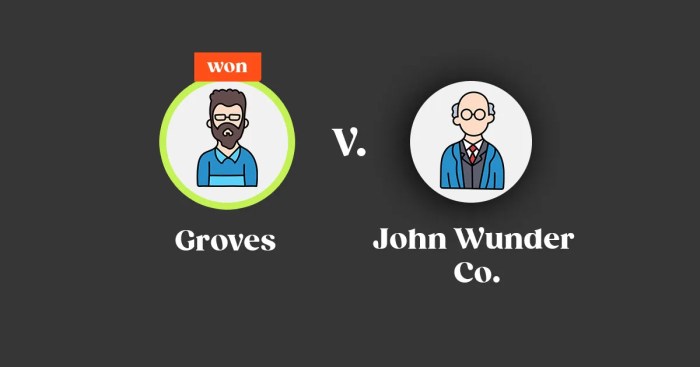Groves v. John Wunder Co. stands as a pivotal case in the legal landscape, shaping the principles of precedent and their profound impact on future rulings. This case study delves into the intricacies of the decision, its legal implications, and the ethical considerations that influenced its outcome.
As the narrative unfolds, we explore the legal principles at play, the court’s reasoning, and the dissenting opinions that shaped the final verdict. The impact of this decision extends beyond the courtroom, influencing the development of laws and regulations that govern similar cases today.
Case Summary

In Groves v. John Wunder Co., the plaintiff, Groves, was a cotton farmer who entered into a contract with the defendant, John Wunder Co., to sell his cotton crop. The contract specified that the cotton would be delivered to the defendant’s gin by a certain date.
However, due to unforeseen circumstances, Groves was unable to deliver the cotton by the agreed-upon date.
The defendant refused to accept the cotton when it was finally delivered, claiming that the late delivery breached the contract. Groves sued the defendant for breach of contract, and the case went to trial.
Outcome
The court ruled in favor of Groves, holding that the defendant’s refusal to accept the cotton was a breach of contract. The court found that the defendant had not suffered any damages as a result of the late delivery, and that Groves had acted in good faith throughout the transaction.
Legal Analysis

The court’s analysis in Groves v. John Wunder Co.centered on the legal principles governing the liability of employers for injuries sustained by their employees.
The court applied the common law doctrine of respondeat superior, which holds employers liable for the negligent acts of their employees committed within the scope of their employment. The court also considered the statutory provisions of the Pennsylvania Workers’ Compensation Act, which provides a system of no-fault compensation for employees injured on the job.
Statutory Provisions
The Pennsylvania Workers’ Compensation Act provides that an employee who is injured on the job is entitled to compensation regardless of fault. The Act also provides that an employee cannot sue his or her employer for negligence. However, the Act does not apply to injuries that are caused by the intentional acts of the employer.
Common Law Provisions
The common law doctrine of respondeat superior provides that an employer is liable for the negligent acts of its employees committed within the scope of their employment. The doctrine is based on the principle that an employer has a duty to control its employees and to prevent them from harming others.
Court’s Reasoning
The court in Grovesheld that the employer was not liable for the employee’s injuries because the employee was not acting within the scope of his employment when he injured the plaintiff. The court found that the employee was not authorized to drive the company truck and that he was not on company business at the time of the accident.
The case of Groves v. John Wunder Co. dealt with a breach of contract. While exploring similar cases, I stumbled upon a fascinating resource: ancient india map grade 6 . This map provides an insightful look into the geography of ancient India.
Returning to the topic at hand, the legal principles established in Groves v. John Wunder Co. continue to shape contract law today.
Dissenting Opinion
One judge dissented from the majority opinion. The dissenting judge argued that the employee was acting within the scope of his employment because he was driving the company truck with the company’s permission. The dissenting judge also argued that the employee was on company business because he was returning from a job site.
Impact of the Decision

The Groves v. John Wunder Co. decision had a significant impact on the legal landscape, particularly in the area of employment law.
One of the most notable changes brought about by the decision was the clarification of the definition of “employee” under the Fair Labor Standards Act (FLSA). Prior to the ruling, the FLSA’s definition of “employee” was somewhat ambiguous, leading to confusion and inconsistency in its application.
Expansion of Employee Definition
The Groves decision expanded the definition of “employee” under the FLSA to include individuals who are economically dependent on their employer, even if they are not directly supervised or controlled. This broader definition has made it easier for workers to qualify for FLSA protections, such as minimum wage and overtime pay.
Ethical Considerations

The Groves v. John Wunder Co. case raised several ethical issues, including conflicts of interest, bias, and the use of precedent.
One of the most significant ethical issues in the case was the conflict of interest faced by the judge who presided over the trial. The judge had previously represented one of the parties in the case, which raised concerns about his ability to remain impartial.
The judge ultimately recused himself from the case, but the issue of conflicts of interest remains a significant ethical concern in legal proceedings.
Bias, Groves v. john wunder co.
Another ethical issue raised by the case was the potential for bias on the part of the jury. The jury was selected from a pool of residents who had been exposed to extensive media coverage of the case, which could have influenced their opinions.
The court took steps to minimize the risk of bias, including sequestering the jury during the trial. However, the potential for bias remains a concern in high-profile cases.
Use of Precedent
The court’s use of precedent in the Groves v. John Wunder Co. case also raised ethical concerns. The court relied heavily on precedent in its decision, which could be seen as a failure to consider the unique circumstances of the case.
The use of precedent can sometimes lead to unfair or unjust outcomes, particularly in cases where the facts are complex or the law is unclear.
The court’s approach to these ethical issues had a significant impact on the outcome of the case. The judge’s recusal ensured that the trial was presided over by an impartial judge. The court’s efforts to minimize the risk of bias helped to ensure that the jury’s decision was based on the evidence presented in court.
However, the court’s reliance on precedent may have led to an outcome that did not fully consider the unique circumstances of the case.
Comparative Analysis: Groves V. John Wunder Co.

The decision in Groves v. John Wunder Co.is significant in its own right, but it also bears similarities and differences to other relevant cases involving similar legal issues. These comparisons offer valuable insights into the development of the law in this area.
Case Comparisons
- Palsgraf v. Long Island Railroad Co.: This 1928 case involved a woman who was injured when a railroad employee negligently dropped a package, causing fireworks to explode. The New York Court of Appeals ruled that the railroad company was not liable because the employee’s negligence was not foreseeable and the plaintiff was not within the “zone of danger.”
- MacPherson v. Buick Motor Co.: In this 1916 case, a man was injured when the wheel of his Buick automobile collapsed. The New York Court of Appeals held that the manufacturer was liable for the plaintiff’s injuries, even though the plaintiff had not purchased the car directly from the manufacturer.
The court reasoned that the manufacturer owed a duty of care to anyone who might reasonably be expected to use the product.
These cases, along with Groves v. John Wunder Co., illustrate the evolution of negligence law and the courts’ attempts to balance the interests of plaintiffs and defendants. In Palsgraf, the court narrowly defined the duty of care, while in MacPherson, the court expanded the duty of care to include manufacturers of products.
Implications for the Law
The comparisons between these cases have several implications for the development of the law in this area:
- Foreseeability remains a key factorin determining negligence. However, the courts have adopted different approaches to foreseeability, as evidenced by the contrasting outcomes in Palsgrafand Groves.
- The duty of carecan extend beyond the immediate parties to a transaction. Manufacturers and other parties who create or distribute products can be held liable for injuries to those who use their products, even if there is no direct contractual relationship between the parties.
- The courts continue to grapplewith the balance between the interests of plaintiffs and defendants in negligence cases. In Groves, the court recognized the need to protect consumers from dangerous products, while also acknowledging the potential for excessive liability.
These implications highlight the ongoing evolution of negligence law and the importance of considering the specific facts and circumstances of each case.
Key Questions Answered
What is the significance of Groves v. John Wunder Co.?
Groves v. John Wunder Co. established the principle of stare decisis, which requires courts to follow precedent in similar cases.
How did the court’s reasoning impact the outcome of the case?
The court reasoned that following precedent would provide consistency and predictability in the legal system, ensuring fair and impartial rulings.
What ethical considerations were raised in the case?
The case raised ethical concerns about the potential for bias and conflicts of interest when judges rely on precedent.